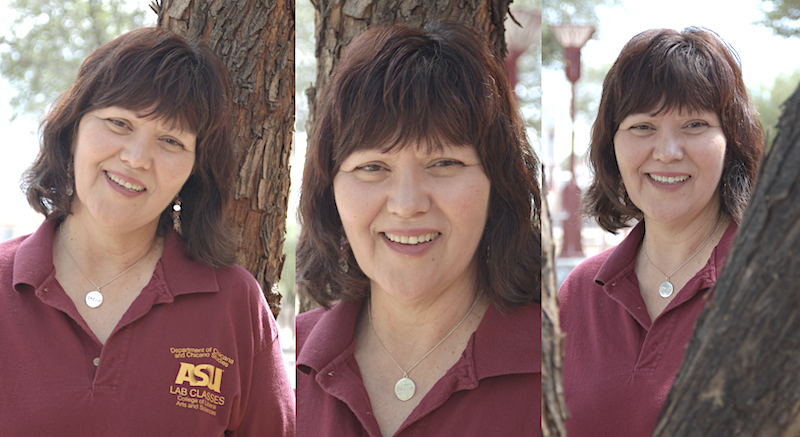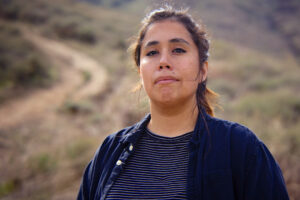In this interview, Stella Pope-Duarte, the Arizona award-winning Chicana writer and author of Fragile Night and Let Their Spirits Dance, talks about her current literary plans, her third book about the women of Juárez, and her promise to reach a younger audience.
What is Stella Pope-Duarte currently doing?
What I am doing immediately is a month-long writer’s residency in one of the schools on the southside of Phoenix, with a group of elementary school children. It is something that brings me great joy, because these are young writers that are very bright and very creative. I am expecting great things from them. I am really expecting to see some of their names later on; knowing that they attended my workshop when they were ten years old and now they are thirty years old and publishing. I am pretty happy about that, that I’ll have the opportunity to do some foundational type of work.
RELATED ARTICLE
Is this program through an organization or school? How can someone else bring this program to their school?
They would just go to the Arizona Commission on the Arts website because I am a writer in residence. They can go to the website to the writer’s roster and request me.
Your third book about the women of Juárez project, how is it coming along?
That’s completed, after three years, fifth version; right now I am pretty happy with the way it looks and the way it is.
What is your next step with this book?
The next step is to go into committee with the people who have read it, getting their feedback, and hoping for a publication date.
Will you be going through the same publisher or are you seeking a different publishing house?
For now it could be a different publisher because things change in the publication world. A big house like Harper-Collins is constantly changing. Some of the people that I worked with at Harper are no longer there, so the dynamics change in a huge house like that, and because that publishing world is so competitive, it is tough. What I am trying to do with the book about the women of Juarez is maybe to keep it here, more regional because it’s close to the border, and we understand those issues. They [Harper] seem like they don’t understand the intensity of what has happened to these young women. They don’t have the same urgency that we have, so I am hoping that where it is now they will take it.
Why did this topic become something so important to you? We know that you embraced it, and probably self-funded much of your research. Why is that?
It’s the brutality of the murders; the defacement of the women. It is very shocking. I read forensic reports; I’ve been to the city municipal building in Juárez; I’ve spoken to investigators; I’ve spoken to organizations that work with the women; and for a while there I was trying to run away from it, because of the pain. I have children, and as a mother, you don’t want to know that they did this to these poor little girls. But there really is nowhere to run when you have been asked, I think internally, to do something. So the call was on me, I think, to give voice to these young women. I think to myself, first I gave voice to the youngsters on the Vietnam Wall [in Let Their Spirits Dance], now I am giving voice to these young muchachas who have been brutalized and murdered. There is a lot of dynamics in Juárez and that concerns me, because of this one thing: Juárez’ murders are spilling over. The attitude of -towards the woman- ‘If you don’t do as I say’ –si no te portas bien– and this is what the ladies were telling me– ‘Te va a pasar como a las mujeres de Juárez’- the same thing that happened to the women of Juárez is going to happen to you. So in Chihuahua City, many murders as well; Guatemala city: bodies of young women on the streets, murdered. There is now that attitude of this terrible machismo; a murderous attitude against women is spilling over. I think people who close their eyes to it are going to be very sorry, because if it continues, that same type of “I’m going to murder you, and I’m not just going to murder you but, I’m going to deface you,” attitude, this is what they are dealing with, I don’t want to get into details, but their bodies are in terrible, terrible state and condition, and that is something that we as a society better take very seriously.
How do you feel in regards to domestic violence here locally. Is it comparable to what is going down in Juárez?
Domestic violence here, I believe, has always been something that has shattered the family. What’s going on over in Juárez is something that is, I believe, unheard of in the history of the world. To begin to call a city the city of murdered women, to begin to say to the city you have murdered your women, and you’ve allowed it. So now it has a reputation, the Juárez murders, of being the crime of the century. It doesn’t compare to the heinous crimes we’ve heard of other serial murderers. So this is like a unique, kind of a once-in-the-history type of event that’s going on, unfortunately in Juárez. And then, you look at Tijuana, because I had these discussions there, and I’m asking them if Tijuana is comparable to Juárez in all of this, in being transient, a border town, the problem with the drugs, with the drug cartels –it has a tremendously powerful cartel just like Juárez does, so you have some very heavy cartels, but why? And I am not saying that murders aren’t happening there in Tijuana, but not the way they’re going on in Juárez, and not the defacement of the women, not in the same horrible manner, that I cannot understand. Even as I wrote the book, I don’t understand why these two cities, that are very comparable to one another, unless for some reason, the murders or the ones that are serially responsible for this live in Juárez, it’s a mystery.
As a Latina woman writer, how has the community in Arizona embraced you or accepted Stella Pope-Duarte as an author?
Extremely embracive, I don’t know what to say. Everywhere I go and speak, I try to speak from my heart, I try to say things that matter to me, that I hope matter to other people, I don’t spare myself. I question my own heart, I take off my masks, and do my internal work, so that I can be worthy to share with others. The people are extremely –I hate to say this but– loving to me. Sometimes the wave of their love overwhelms me. What is tough in the Latino publishing world –and you know this yourself, Yolie– is that people who don’t know the author or don’t know the work, will look at a Latino name, like Stella Pope-Duarte, but they’ll say ‘no, I don’t want to read her because she’s not Scott Taylor or Stephen King or someone that they know, so they’ll reject. That kind of stings me, because I think to myself, ‘If you would give me a chance, you would see that we have a lot of things in common, even though you come from this or that background, we really do.’
How have you dealt with success?
Success is a high and a low for a person like myself, who was the shyest girl in school. So you’re talking about a very like introverted little girl who never said anything, who now has had to come into her own through God’s grace. So I’ ve had to, how should I say, come up to another level, and everybody does; we’re all called to higher levels, and I’ve had to step up, so to speak, to the plate. Even though I enjoy the love, the attention and everything, there’s a part of me that guards myself. I think every writer has to, or they won’t produce. As a matter of fact, if a writer is too much out there, they’ll never produce, because they have no parameters, no place for ourselves to produce. Some writers are like that, they keep saying: ‘I’m going to write the next book…’ Fifteen years later, they’re saying the same thing.
Is there anything that Stella Pope-Duarte wants to share with Barriozona Magazine that maybe no one else is aware of about what Stella Pope-Duarte is doing or thinking about doing, or maybe a fourth book
There are other books. As a matter of fact, I already have a stack this big [she signals about six inches high] of notes and presentations that I’ve done, and the next book, hopefully, will be Tending the Flame [Writing Through Revelations, Visions and Dreams]. And Tending the Flame is doing internal business, what I call “square one”, not being afraid to live in your own landscape, and to say to yourself, ‘Okay what is it about me that I need to understand’. So I’ve gone out and I’ve done workshops related to Tending the Flame. I did one at Notre Dame, it was titled Tending the Flame Writing for Revelation, Visions and Dreams. But it doesn’t have to be centered on the writer; because there’s a lot of work that needs to be done here [she circles her chest and abdominal areas]. I tell people, ‘If you come to terms with the dark principles in your life, then you won’t have to marry them’. So the whole thing is centered on being true to you. If love doesn’t start within, then it doesn’t start at all; this is scriptural. Christ himself said: “Love others as you love yourself.” People forget that and sometimes they get lost. Tending the Flame is coming, as well as some children’s books, because I promised the children.
Learn more about Stella Pope-Duarte
© 2006 – 2023, Yolie Hernandez. All rights reserved.





